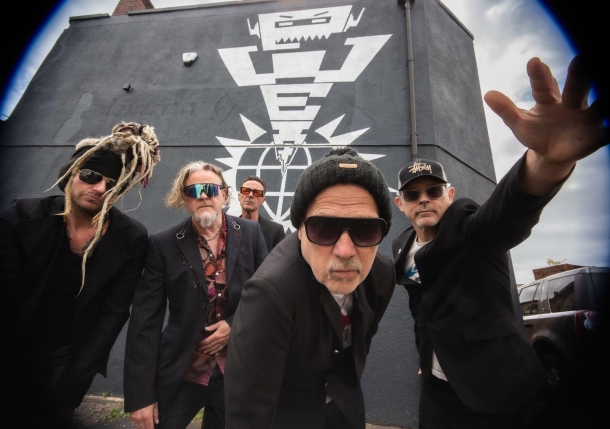The cyberpunk rebels of British alternative rock
Pop Will Eat Itself, cyberpunk rebels of British alternative rock, will be live at The Fleece in Bristol on Sunday 9 November 2025.
In the ever-evolving tapestry of British alternative music, few bands have embodied the anarchic, genre-mashing spirit of the late 1980s and early 1990s quite like Pop Will Eat Itself. With a name borrowed from a NME article forecasting pop culture’s eventual cannibalism, the band emerged as an irreverent, post-modern force blending punk energy, hip-hop beats, industrial noise, and infectious pop hooks.
GET TICKETS HERE
Origins and Early Days
Formed in Stourbridge, England in 1981, the band originally went by the name Wild and Wandering, fronted by Clint Mansell (vocals) alongside Graham Crabb, Richard March, and Adam Mole. Initially inspired by new wave and post-punk, their early work was guitar-driven with a playful, sarcastic edge.
By 1986, the band rebranded as Pop Will Eat Itself (often affectionately dubbed PWEI by fans). Their debut album, Box Frenzy (1987), marked a significant shift, fusing indie rock with burgeoning hip-hop influences, aided by extensive use of samplers — a rare approach for a rock band at the time.
Industrial, Electronica, and Alternative Rock
As the 1980s gave way to the 1990s, PWEI's sound evolved to incorporate elements of industrial rock, electronica, and dance music, placing them alongside contemporaries like The Jesus Jones, EMF, and Ned’s Atomic Dustbin within the grebo scene — a term describing scruffy, anarchic British bands blending punk, electronic, and alternative sounds.
Their landmark albums This Is the Day...This Is the Hour...This Is This! (1989) and Cure for Sanity (1990) showcased their sample-heavy, genre-hopping style, layering machine-gun drum patterns, distorted guitars, rap-style vocals, and pop culture references. Tracks like "Def. Con. One", "Can U Dig It?", and "Wise Up! Sucker" became cult anthems of the alternative club scene.
Cultural Impact and Innovation
Pop Will Eat Itself wasn't just about their sound — they also exemplified a media-savvy, ironic, and self-aware approach to music and pop culture. They frequently sampled movie clips, TV themes, and famous soundbites, anticipating the mash-up culture that would later flourish in the digital age.
While they never achieved major mainstream success in the US, in the UK and parts of Europe they amassed a dedicated fanbase, renowned for their energetic, chaotic live shows.
The band’s style and ethos also influenced the development of industrial rock and big beat — with members like Richard March later co-founding the successful electronic group Bentley Rhythm Ace. Frontman Clint Mansell pivoted from PWEI’s noisy anthems to a highly acclaimed career as a film composer, creating haunting scores for director Darren Aronofsky’s films, including Requiem for a Dream, The Fountain, and Black Swan.
Breakups, Reunions, and Legacy
Pop Will Eat Itself originally disbanded in 1996, but have periodically reformed in various lineups since the early 2000s, releasing new material and continuing to perform. Albums like Dos Dedos Mis Amigos (1994) remain touchstones for fans of alternative rock’s edgier, more experimental corners.
In retrospect, PWEI’s gleeful disregard for genre boundaries and their cut-and-paste, remix-heavy approach to pop culture foreshadowed the internet age’s remix culture and genre hybridization. Today, they are rightly remembered as cyberpunk pranksters, pioneers of sample-driven rock, and champions of the idea that pop, in all its forms, could — and would — eat itself.
